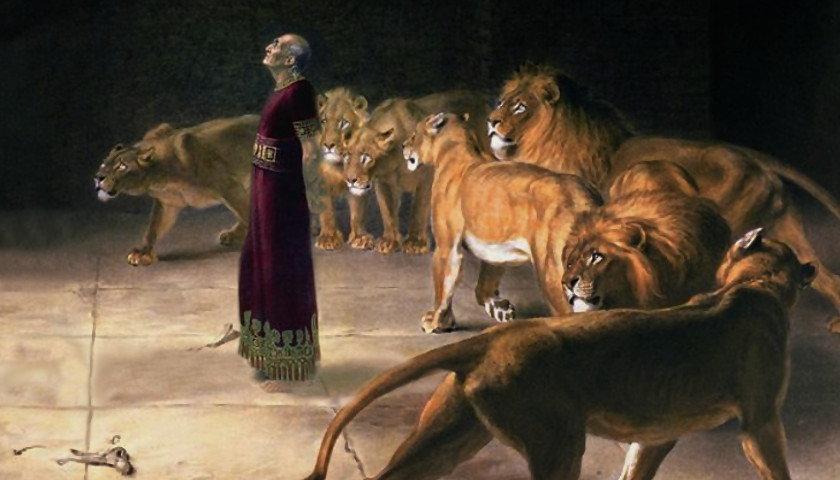by Theodore Roosevelt Malloch
There is an old Puritan hymn (based on the apocalyptic Old Testament book of Daniel for the less-than-biblically literate) we grew up singing. Perhaps you recall it:
Dare to be a Daniel,
Dare to stand alone;
Dare to have a purpose firm,
Dare to make it known.
In a famous essay written just after World War II, George Orwell, in one of his great punchlines, suggested, “to bring this hymn up to date one would have to add a ‘Don’t’ at the beginning of each line.”
He was talking about the timidity of modern people, thinkers and doers alike, in relatively safe circumstances, to be quiet about dishonesty. Doesn’t intelligence require truth-telling? But then in the first sentence of Nineteen Eighty-Four, Orwell himself wrote satirically: “It was a bright cold day in April, and the clocks were striking thirteen.”
In our present-day Chinese-induced viral pandemic, which started with colossal lies from the East, perhaps it is time to get to the essential truth.
Our brilliant global elites over a number of decades made a dangerous Faustian bargain with the Communist Party of Beijing. The deal was supposed to bring them into the capitalist fold and yield greater international order.
Instead, it has led to this tragedy. We were told untold economic benefits would make them “good democrats,” as we outsourced our jobs to them. Clearly, they are not, and the Communist deception continues unabated.
In a word, we were conned.
Isn’t it time to pull ourselves from the swamp of political correctness, the lies of advertising, and a near-total bureaucracy that has consumed so many secular people, especially academics and media pundits?
Global poverty, we were likewise told, is the greatest challenge of our time. Many still believe investments in education to be an essential part of the solution to this grand challenge. Despite spending $2.3 trillion on development assistance over the past 50 years, as William Easterly reminded us in, White Man’s Burden: Why the West’s Efforts to Aid the Rest Have Done So Much Ill and So Little Good, failure abounds.
Easterly writes:
In foreign aid, Planners announce good intentions but don’t motivate anyone to carry them out; searchers find things that work and get some reward . . . Planners apply global blueprints; searchers adapt to local conditions. Planners at the top lack knowledge of the bottom, while searchers find out what the reality is at the bottom. Planners never hear whether the planned got what it needed; searchers find out whether the customer is satisfied.
So, we ask as searchers, might it be time for leaders, for philanthropists, for business executives, for politicians of all stripes and locales, and for the citizenry at large, to lead where others fear to tread? Donald Trump has been willing to go there. Why not follow his lead? Dare.
To rethink ways forward, not in some new plan or phony U.N. “millennium goals” but merely by utilizing the magic of the market and the well-known reward of good old American entrepreneurship and innovation?
Toward a New Economy of Thrift
If we ask those questions in the light of the considerations raised in this present corona crisis, then we are surely guided to thrift, as a much-needed virtue and as an illustration of the true meaning of spiritual capital, of our American aspirational can-do-ism. Thrift, in its Old Norse origin, meant literally “to thrive.”
How can we thrive again?
I have tried to show the place of thrift and thriving in a theological worldview as well as its effects in generating an economy of stewardship rather than of consumption. Thrift serves as a link between spiritual investment and material reward. And the reward is not merely an increase in productivity and delayed gratification but care for others, for the environment, and for future generations.
An economy of thrift is one that bears the imprint of the legacy from which it springs. It is one that answers both to the demand that we conserve the earth’s resources, and to the demands of philanthropists, that we care for the poor. It is an economy that shows the effect of reinvesting capital, namely, and perhaps most importantly, to conserve the permanent things.
In place of that economy, however, we have seen the emergence of the economy of transient and consumable things, too many of which were made cheaply and by slave labor in China. I would side with those critics of the consumer society who have seen the fragmentation of the family, the loss of commitment, and the growth of short-term pleasure-seeking as its most evident effects.
I agree with them that, even if in some attenuated economic theory, the consumer society is capable of self-perpetuation in a continual orgy of stale delights, it will provide only an impoverished life to its members. It will be a life without (the pursuit of) happiness, because without solid virtues, a life in which the old ideas of duty, sacrifice, and responsibility have no place, love is dethroned from its place in the center of things.
The remedy for this state of affairs is not more state action, more welfare programs, yet another congressional bailout, and more interference and regulation from above in the workings of the market. The remedy comes from below, in the reinvestment of all forms of capital. It comes from people once again taking charge of their own lives, seeking to live as those Calvinist Scots of the 17th century lived, in a state of responsible stewardship over all resources within their control, saving for the future, spending on others in need, and living a life of goodwill and piety, according to the law of God, not some left-wing “Green New Deal” or WHO political edict.
Restoring Republican Virtues
Perhaps today, together and by leveraging our minds, we can achieve a new revolution in ethical thinking and doing. That’s if we, as the prophets of old suggested, dare to be Daniels. Thrift and its sister virtues, if truly embraced and followed, if fueled and lived, if tied to all the other moral virtues, would, without doubt, lead to greater human flourishing.
In fact, as the American Founders intended, Benjamin Franklin especially, those virtues would supply us with unprecedented benevolence. The disposition to do well would emanate from an inclination to be charitable and, in the end, would be a gift from generosity. All of this would occur if the virtues became less forgotten and, instead, found new favor and life among us all.
That is the opportunity of this hour. And there is abundant evidence that Americans everywhere are stepping up, lending a hand, volunteering, and contributing, as they always have.
Their renewal would perhaps be best activated if we in this unusual period of respite and solitude, like the poet Gerard Manley Hopkins, simply took time and came to appreciate again what he called, the “dappled things”:
Glory be to God for dappled things—
For skies of couple-color as a brinded cow;
For rose-moles all in stipple upon trout that swim;
Fresh-fire coal chestnut-falls; finches’ wings. . . .
All things counter, original, spare, strange;
Whatever is fickle, freckled (who knows how?)
With swift, slow; sweet, sour; adazzle, dim;
He fathers-forth whose beauty is past change:
Praise him.
– – –
Theodore Roosevelt Malloch is a scholar, diplomat, and strategist who was active in the Trump campaign in 2016.





